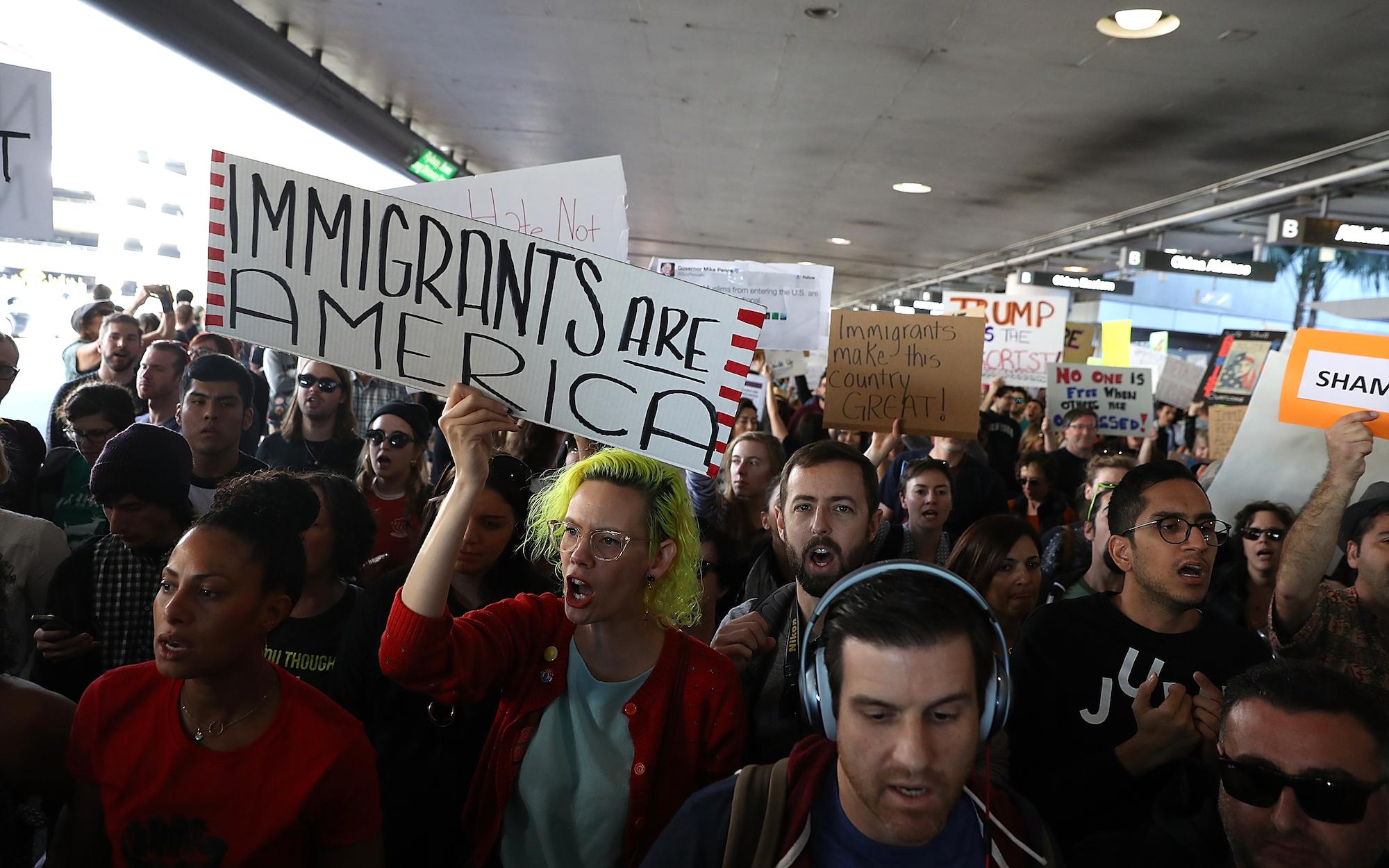Donald Trump immigration ban: 60,000 visas revoked after travel restrictions imposed on seven Muslim-majority countries
Number emerges during hearing for lawsuit filed by two Yemeni brothers affected by controversial policy

Tens of thousands of visas have been revoked from travellers heading to the US under Donald Trump's travel ban, according to a US Department of Justice lawyer. The State Department confirmed "fewer than 60,000 individuals' visas were provisionally revoked".
The number came during a Virginia court hearing for a lawsuit filed by two Yemeni brothers who had flown in to Dulles International Airport last Friday and were quickly put on a return flight to Ethiopia.
"The gasp was audible in the room," Simon Sandoval-Moshenberg of the Legal Aid Justice Center, who represents the brothers, told The Independent.
The higher number from the Justice Department included diplomatic and other visas that were actually exempt from the travel ban, as well as expired visas, they said.
President Donald Trump's order bans travel for people from the majority-Muslim countries Iran, Iraq, Syria, Sudan, Somalia, Libya and Yemen.
It is not yet clear who has been affected or what countries they came from, but Mr Sandoval-Moshenberg said the thousands of revoked documents includes immigrant and non-immigrant visas.
"I think this number is going up daily. We know someone in Iran who had an appointment at the US Embassy tomorrow to get his visa and it's been cancelled," he said.
His clients, brothers Tareq and Ammar Aqel Mohammed Aziz, have agreed a deal with the government to come back to the US. The Legal Aid Justice Center represents nine individuals - two families - who have been affected by the ban and it appears the US government will have to work out legal reprieve on a case-by-case basis.
Erez Reuveni of the Office of Immigration Litigation at the Civil Division of the Justice Department also said no returning legal permanent residents have been denied entry, and it is not clear whether the 60,000 number includes refugees, which are the smallest category of people affected.
The executive order, signed by President Trump last Friday, indefinitely suspended Syrian refugees, and barred nearly all travellers from seven Muslim-majority countries - Iran, Syria, Yemen, Iraq, Somalia, Libya and Sudan - for 90 days and blocked refugees for 120 days.
Within hours of the order being signed, there was widespread confusion around the country, including in neighbouring countries such as Canada and Mexico.
Hundreds of people who had flown to the US from the seven nations while the order was being signed were detained and placed in handcuffs at airports, questioned for hours, and many of them sent back on a return flight. No clear guidance had been sent to airports or airlines; there were also questions of dual citizenship and no exceptions laid out for people who lived and worked in the US or who were travelling to receive emergency medical treatment.
The ban also entangled US university students from abroad, and tore families apart who, within hours, became stranded by the signing of Mr Trump's pen.
Thanks to massive protests at airports around the country like at John F Kennedy Airport in New York, several detainees were freed, including an Iraqi man who had worked as a translator for many years for the US military and whose family lived in the US.
Civil rights groups such as the American Civil Liberties Union and the Council on American-Islamic Relations were outraged at the order, which they deemed unconstitutional and targeting the most vulnerable sectors of society.
At least four states filed lawsuits to challenge the constitutionality of the executive order. In California and Michigan, federal judges ruled that the order could not ban lawful, permanent US residents or green card holders.
Steve Bannon, Mr Trump's chief strategist, was said to be behind the green card mandate, and he had overruled the Department of Homeland Security's objections. Mr Bannon, the unelected right-hand man to the President, is now a permanent member of the National Security Council.
Once the refugee resettlement programme is resumed, the US has vowed to only take in 50,000 people in one fiscal year.
Mr Trump has consistently defended the ban, saying it would prevent "bad people" with "bad intent" from coming to the US.
House Speaker Paul Ryan also defended the ban, saying it made sense for the US to take a pause and review its vetting procedures, but said the roll-out of the order was done poorly and the confusion it caused was "regrettable".
A report from the Cato Institute found that there had been no Syrian-related terrorist event in more than four decades on US soil. Countries such as Saudi Arabia or Egypt, from where terrorists came to the US to carry out large-scale attacks, were not featured on Mr Trump's hit list.
Join our commenting forum
Join thought-provoking conversations, follow other Independent readers and see their replies
Comments